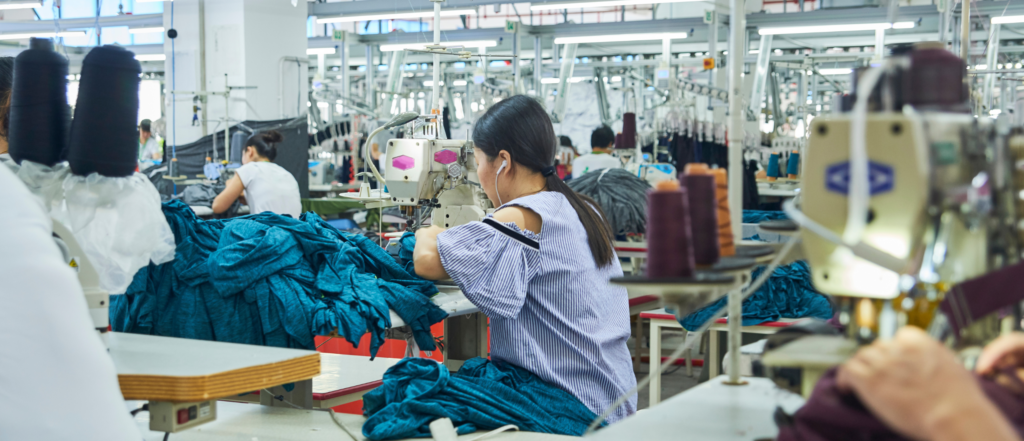
The Rise of Traceability in Fashion
The fashion industry has witnessed a seismic shift towards sustainability, driven by rising consumer awareness and regulatory pressure. Central to this movement is the concept of traceability, which once was an afterthought and is now becoming a fundamental requirement for brands who are looking to establish credibility in their sustainability claims.
Traceability in fashion involves tracking a garment’s journey from raw material sourcing to manufacturing, distribution, and retail. It enhances transparency within the industry and is often used by brands as a tool to promote sustainability to consumers. Knowing the origin of clothing can provide valuable insight into how ethically and sustainably it’s made – but traceability only tackles one side of a garment’s journey.

Understanding Environmental and Ethical Impacts
Traceability can offer the foundation for evaluating the credibility behind environmental, ethical, and social sustainability claims with fashion production. Without a clear understanding of where raw materials and the intricacies of the supply chain originate from, sustainability claims can feel hollow. From greenhouse gas emissions to labor conditions, traceability provides the necessary data to substantiate these claims and drive meaningful change.
The Investment in Traceability
While the benefits of traceability are crystal clear, implementing comprehensive traceability measures has its challenges, especially when it comes to the cost involved. From technology investments to supplier engagement initiatives, brands need to allocate resources to ensure the integrity of their supply chains. However, brands have to recognize that it’s a necessary investment in safeguarding their operations and reputations, not just a basic expense.
Part of the investment involves building collaboration and trust between brands and suppliers – a crucial step to traceability. The larger the brand, the greater the struggle to gain visibility into its full network of suppliers, highlighting the need to restructure how supply chains are achieved to begin with. By fostering deeper relationships built on trust and mutual benefit, brands can incentivize suppliers to embrace sustainable practices and contribute to a more transparent supply chain ecosystem.
Navigating Consumer Scrutiny
The world is waking up to the need for transparency and brands can’t afford to overstate their sustainability efforts without facing consequences. The issue of “greenhushing” – also known as underreporting ESG (Environmental, Social, and Governance) initiatives – underscores the need for authenticity and accountability. Internally, brands may still report this data to specific steakholders but choose not to share it publicly. As consumers demand greater visibility into how brands are making an impact, there’s an ever-growing need to navigate this delicate balance between marketing sustainability efforts and avoiding accusations of greenwashing.
With growing concerns over forced labor and worker conditions, fast fashion brands are facing increased scrutiny over their supply chain practices. Traceability offers a means to address these issues head-on, showing every tier of the supply chain and holding brands accountable for ethical sourcing. By prioritizing transparency and collaboration, brands can work towards addressing systemic challenges and driving positive change within the industry.
Traceability is Only One Piece of the Puzzle
While traceability is essential to addressing fashion’s environmental impact, it doesn’t cover all the bases for achieving true circularity – it only addresses concerns up to the point of sale with the end consumer. Designing garments with next-life logistics in mind, brands addressing overproduction, and finding channels for unwanted clothing are also critical pieces to succeeding at sustainability initiatives within the industry.
This is where organizations like Deband can complement these traceability efforts. Rather than stopping the conversation at the retail stage, we can engage with what happens to the garments that don’t sell, the overflow stock sitting in a warehouse, the returned items that can’t be resold in-store, and the items that consumers have worn out in a season and no longer want. Those are the items that end up in landfills around the globe, and our curated services for next-life logistics can find a new life for them instead. Traceability can initiate the momentum needed to strategize end-of-life solutions for clothing, leading brands down a more circular path.
Paving the Path Towards Sustainability
As the fashion industry continues to course-correct with the complexities of sustainability and ethical accountability, traceability emerges as a linchpin for progress. By embracing traceability as a strategic investment, brands can navigate the evolving landscape of consumer expectations and regulatory mandates with confidence. Through collaboration, innovation, and a commitment to transparency, the industry can forge a path towards a more sustainable and ethical future for fashion.

